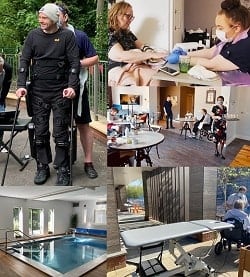The Covid-19 pandemic has led to a subtle shift in the types of clients requiring rehabilitation services. There is now a new group of people who are actively seeking rehabilitation to help them recover from the effects of the coronavirus. In addition, there are people who have had their hospital rehab following surgery or illness cut short (or not even started) due to being discharged earlier than planned. We discuss post-COVID rehabilitation and active respite.
Many problems can develop following a long-term stay in hospital and in particular a stay in ITU. These problems range from musculoskeletal and neurological problems to speech and language and cognitive problems.
As the pandemic continues, the number of people needing rehabilitation is likely to grow with the increased number of survivors putting a strain on the hospital rehabilitation professionals.
Rehabilitation to help recovery from COVID-19
We are extending our services to those seeking rehabilitation for their recovery from COVID-19. As with all our rehabilitation care, we take a multi-disciplinary approach and provide therapies to help clients with respiratory problems, as well as musculoskeletal and neuro physiotherapy, nutritional advice and psychological support as they regain their health.
Rehabilitation – establishing new ways of working
At STEPS we support complex needs in a small family environment. Over the past weeks we have had to implement new ways of working and introduce a variety of measures to protect clients (as much as we possibly can) from the virus.
On the 6th May we re-commenced our hydrotherapy, which was briefly suspended as a protective measure. Neurologic music therapy (NMT) had continued throughout lockdown via video, but from the 11th May returned to being delivered within our building. In addition, the Blatchford team (who help support our amputee clients) have also return to the building to continue working directly with clients again.
Clients at STEPS have access to a range of specialist skills, facilities and equipment and are supported by one of our Consultants in Rehabilitation medicine.
Therapies we offer:
- Physiotherapy neuro, musculoskeletal and respiratory
- Occupational therapy
- Speech and language therapy
- Technical instructor strengthening and conditioning
- Neuro psychology
- Social work
- NMT
Some people will need assistive products such as walking aids and orthotics. We continue to work with several companies to provide these should they be needed.
Rehabilitation is about regaining function and independence and that is at the centre of everything we do at STEPS. We focus on individual goal setting to enable each client to return to as close to the level of function pre-virus as possible.
STEPS Active respite package:
Active respite packages are suitable for people living with a long-term condition/disability or following surgery such as joint replacement, a flare up of a chronic illness or oncology treatment. This package offers clients and carers a break from usual routines, whilst providing a therapeutic approach to daily living. Our team of therapists and nurses will complete assessments and work with you to ensure that the approach is maintained throughout all interventions to maximise independence during your stay. This can then be continued once you return to home. This package is suitable for clients who have suffered a spinal cord injury or a stroke or long-term neurological conditions such as the following:
- Multiple sclerosis
- Motor neurone disease
- Muscular dystrophy
- Parkinson’s disease
The minimum stay on the Active Respite package is 10 days, please call us to discuss.
Infection control and PPE
We are maintaining very strict cleaning routines and currently barrier nursing all our clients. We have a good supply of all PPE and at the time of writing we are Covid-19 free.
